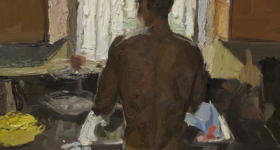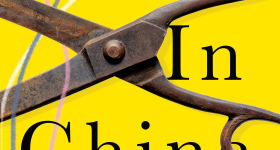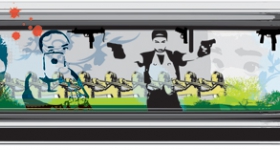Grandpa is in the hospital because of bowel obstruction and he also needs dialysis now. He’s okay but in a lot of pain and discomfort. Just keep him in your prayers
- 8:49 p.m. Saturday, November 4th
This means, I learn later when I call my mom, that he's having respiratory problems and his vitals aren't great. This makes the doctors nervous to operate on the obstruction — a medical term that is in itself dispiriting.
Grandpa is not doing well. I am going Home on Wednesday
- 12:34 p.m. Monday, November 6th
This means that he is not breathing on his own. Lola (my grandmother) is at his side, talking to him and telling him his favorite youngest daughter is traveling 13,665 miles to be there with him. The anxiety of waiting for an update from 13 time zones in the future — the three gray dots on the text message screen skipping up and down — was too unbearable for her.
Pausing. Skipping. Pausing.
Filling the void with a text of the news you don't want to hear coming over in a cheerfully colored blue speech bubble.
Grandpa passed away this morning. Keep him in your prayers
- 10:54 a.m. Tuesday, November 7th
When Roland Barthes wrote that “Waiting is an enchantment — I have received orders not to move,” he probably didn’t have a dying relative to consider.
**
Not being able to fully understand life in the Philippines and, in particular, the lives of those whose blood I share, whose homes include photos of Childhood Me — an inexplicable white blotch among the tan and brown faces — is always inclusive to my experiences traveling there. It was still true during the trip my mother, brother and I made last August, three months before Grandpa passed away.
I was the monolingual American, coming from overseas to revel in the cheap prices of everything, complain about the heat, throw questioning glances at some (many) of the traditional dishes, and, of course, have more photos of me taken. This chronicling of my aging over the years begins with my birth and up to the August trip, which took place mere days after my 25th birthday.The last time I visited Home, as my mom refers to the Philippines, I was a seventh grader with a sense of style deeply informed by 50 Cent but purchased at PacSun.
English is spoken almost everywhere in Manila. It’s represented on advertisements and scribbled onto concrete walls, clapboard signs and luxury malls. It carries a singsong quality there, a sheen of bemusing translucence that was forfeited in the United States long ago. There’s an enthusiasm to annunciate Americanisms — Cool! Whatever dude! So awkward! — that stubbornly glimmers even after the thousandth occurrence of hearing one of those infernal Jollibee commercials. The language seemed to sprinkle the country with a lightness of being; a not wholly unintentional balm from the unending vehicular congestion, rampant noise and heat and the languid street animals everywhere among the Byzantine sidewalks and half-built roadways.
Also present was the attenuated sense of a state under siege, a feeling that hung limpidly in the air like laundry. The threat of violence from rampaging gangs or corrupt police, inflamed by news reports and sensationalized sound bites from President Duterte, was more a bug than a feature of the country so far as I could tell. In fact, the most shocking thing I saw in that heavily Catholic country was a vinyl poster on a busy thoroughfare, advertising a gay and transsexual beauty pageant.
Everywhere, too, is traffic. That I remember. Although it's been 14 years since I last visited, this trip was made for a particular purpose, one that would, in time, prove itself false in the most wrenching of ways: it was assumed that this would be the last time to see Grandma in person, given her waning health. Recent injuries had exacerbated Grandma’s health issues, diabetes among them, leaving her on a stringent regimen of medications and procedures administered by a live-in nurse. The person I saw then that summer was a figure at the mercy of not only whatever machine she was plugged into and the efficacy of various drugs but also of her luck and personal will, too. Still, the sum was an unignorable image of a life’s portamento toward its final notes.
Sitting shotgun, trying to stay alert, a shuddering thought crept in: Were we letting acts of tourism excuse us from the hard work of starting the mourning process? Then again, part of moving under the penumbra of grief may be to give yourself a sense of reprieve even if it’s only to take a longer road back to where you should really be. It was no surprise that time was moving much more quickly than the inches forward we purchased in each stop-and-go move, trying to make our way through the capital.
Where do we go? We pass by the former ice factory, my mom recalling a story of how Lola stole ice for her folks and friends and even sold it back to the Korean and Japanese occupiers who held most medical goods and foodstuffs hostage during the war. It’s an ageless story, elastic in its pliability, appealing to anyone who listens and tells it.
Rolling down the leeward side of a bridge spanning the Pasig River, I squint and nod and think I can see the place President Duterte resides, Malacañang Palace, as it’s pointed out to me by our driver — a man whose family has worked for my own for decades. Having paid help isn’t as uncommon or as obtuse a marker of wealth as it is in America, but that he knows the tastes, habits and personalities of my grandparents better than perhaps even my mom does at this point, is deflating to consider.
Before we left for the city center, however, we paid a visit to Grandma, who’d recently been roused from a nap. She talked in a 90-10 split of Tagalog and English while holding my hands in hers, looking me in the eyes and humoring my ineffectual replies in her native language. She got her points across — less malls, more churches — with a wizened look strengthened not only by her forceful character, but a cataract-clouded eye. All told, she appeared much less frail despite all the reports I'd heard through family missives and texts that had otherwise described her.
It still felt apparent then, palpable even, of Grandma’s ability to hold court like her countrywoman and homegrown philosopher, the late Emerita Quito. Whereas my Grandpa Argnani, a name which lives on with my brother, sandwiched between his Nicholas and Caracciolo, was a beardless and unfussy Diogenes of Sinope. Although Diogenes, of Ancient Greece and a noted cynic, claimed to carry his lantern to search for “an honest man,” Argnani was more practical, wielding his flashlight — or, more apt is the British term, an electric torch — to illume and banish the natural gloaming that crowded in on the household every evening.
Since we were out of the house often, being driven from mall to mall, airport to restaurant, one relation’s house to another, we saw Grandpa mostly in the morning and in the evening. The mainline electricity being unaccountable, he carried with him his own backup generator: a sturdy, metal electric torch. If I went upstairs to sleep, he blazed a trail, startling into vision the numerous Catholic figurines stock-still in their perpetual piety, praying for my safe passage from landing to bedroom. If I stepped out onto the backyard, he made sure a light shone on the latch to pull the screen door open with, from wherein the light would extend beyond and onto Grandma’s collection of potted succulents.
The trip’s undeniable purpose was Lola, as the utmost person to be spending our time with and registering the memory of. Grandpa was often awake and busy caring for Lola along with the familial needs that were asked by us three house guests. This often meant that he was awake during the hours I was either fighting wantonly with jet lag or, one night, searching for Wi-Fi in the quieter corner of the house to conduct video interviews with two BuzzFeed employees.
Truthfully, Grandpa saw things neither I nor my brother could see. We could have walked around the house in the relative darkness, sure. The deep, old wood of the home all the more clear, all the more present, with much of the furniture and accoutrements moved to make the space easily navigable to accommodate my grandparents’ stymied swiftness. I can walk stairs blindly, despite Grandpa’s considerations.
But Grandpa knew I was foreign, not totally, not really ever going to be part of his home and nation. At least, not in the short time we had to spend in the country together. So, he shone lights where he could and when he could do best, to provide a clear look at his world even if that meant something as trivial as going to bed or watching the sunset from the familial perch in Quezon City.
**
For our last dinner together before flying home, we went to dine out at a shabu-shabu restaurant. Grandma wore a wonderfully colorful tunic for the big occasion of getting out of the house. Sitting next to me, glad and in loud spirits, she insisted that I plate myself more and more of the many rounds of food before exclaiming in Tagalog something that would make the table (save my brother and I) laugh. By the time the translation of what she said got back to me, it wasn’t necessary — through her actions, the joke had cleared its linguistic hurdles. She squeezed my arm after each bite I took, checking for immediate signs of fattening up, as if a single dumpling would instantly plump up my frame, which she self-deprecatingly compared to hers with a delightful cackle. We returned from the trip with relief.
The fine glow of returning from a warm place persisted through a particularly swampy September in New York. Then, life returned to a new normal with its mundanities and excitement until we received the unexpected messages about Grandpa. In the days following, I attempted to remedy my sense of grief and uselessness by reading.
“You can offer an ill person support with words, food or a hand on the shoulder, but ultimately you are little more than a spectator watching fate play out from seats even farther removed from the field than usual,” Cord Jefferson writes. Reading this, I envision the shock on my mother’s face when she learned of Grandpa’s untenable situation in the hospital.
**
There is a picture of us taken perhaps 25 years ago, and it is impossible for me to recollect the exact moment it depicts. Grandpa is holding me, a year old or thereabouts, and I’m looking away and to the right of the photographer, Mom most likely. He’s looking straight at the lens, however, and is dressed in the comfortable yet amicable manner he exuded — a pale pink Baracuta jacket, key-lime polo buttoned to the neck, a deep blue trucker hat with golden etchings on the brim and “Walt Disney World” stitched across the face in front of Cinderella's Castle.
The location of the photo is immediately recognizable: the parking lot at North Lake Campgrounds in the Catskill Mountains. The arrangement of skinny pines preceded by warbly and pale asphalt in the photo of Grandpa and me is almost certainly of that place which was a popular weekend retreat for my family when I was growing up. And it was, to my knowledge, the first and only time Grandpa visited upstate New York as he didn’t travel to the States as often as Grandma did — her unabashed tennis fanaticism presaging pilgrimages to Flushing to see Pete Sampras, and later, Novak Djokovic, compete.
My brother texted me an image of that photo soon after Grandpa passed. I hadn’t seen it in years, but, pinching and pulling at my phone’s screen to enlarge it, he looks happy and, though we were new to each other at that point, it’s a relative blessing to have a record of ourselves together. It’s a harbor in my mind to tether myself to, months after his passing. It creates a familiar safe place for memory to nuzzle against the heart.
Travel is an immediacy of presence, Eileen Myles writes. Wallowing stateside, such as I am, there is, still, an immanence of feeling that preoccupies me. It’s of remembrance, however; of memorializing a time and a person who now forever appears to me first in a snapshot from decades ago.
**
There is no way to say goodbye to the dying properly.
The steps up to my apartment on the second floor of a pre-war building are crooked. They lean toward the sunrise, the slouching handrail pocked with painted-over divots. If I remember to, I intentionally walk on the left side as a balance, adding pressure to right the warped wood and linoleum. Trying to alter the shape and state of the building, silly and Sisyphean a task as it is, is a practice reinforced by the memory of the last and final interaction I had with Grandpa.
At 4 a.m., before our early flight back to the States, Grandpa was at his usual place at the kitchen table, alert and awake. In our sleep-deprived state, my brother and I fumbled for salutations, punting “thank yous” and “see you soons” for as far as they would carry. Grandma was asleep in the retrofitted guesthouse across the garden.
When I went to shake his hand, Grandpa grabbed my wrist and admired the watch he’d bought me a few days previously at a Wako store. I thanked him again for the gift before stepping back and letting my brother and tearful mother in to hug Grandpa. The house was still very dark and the light in the room was coming from a single fluorescent bulb in the ante-kitchen where someone was cooking the day’s meals for the rest of the household.
We didn’t have any time to sit down and eat more spaghetti with hot dogs, a hearty breakfast staple, so I began to wrap rolls of pandesal in a paper towel when I noticed Grandpa’s electric torch reflecting off the watch. I apologized for stealing what was, in all likelihood, his breakfast. He either didn’t hear me or understand and continued to shine a light on the counter so that I could see.
Later, driving through the barely sunlit Manila streets, fires being breathed into life in the sidewalk charcoal grills from the embers of the previous night’s meals, I realized that he probably left those rolls out for my brother and me.
I hugged Grandpa and began to make my way out to where everyone was waiting in the car. Already, I could hear the dogs my grandparents kept as an immutable alarm system barking, suspicious of all the activity in the twilight haze and butterscotch smell of Manila mornings. Grandpa patted me on the back and loudly told me that next time he saw me, he wanted me to be big. He laughed and said I needed to put on weight and muscle. “Too skinny!” I shrugged it off and inexplicably told him I was just sunburned. He smiled but prodded me to hurry up and directed his electric torch toward the door.
Years of wear, barely masked repair efforts and countless footfalls have turned the stairs in my Brooklyn walk-up noticeably cooked. I can’t, even if I were an Olympic weightlifter with endless time to work the flight of steps, true the angle.










Comments